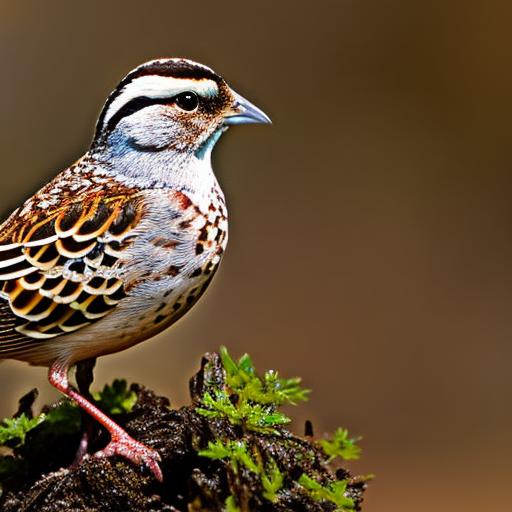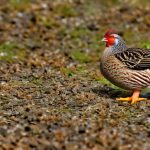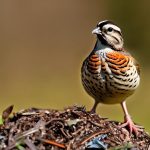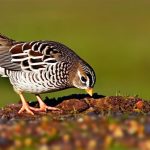Quail keeping has become increasingly popular among homesteaders and small-scale farmers due to the numerous benefits these birds offer. One particular breed that has gained attention is the 729 quail, known for its high egg production and fast growth rate. The 729 quail, also known as the Jumbo Coturnix quail, is a domesticated breed of quail that is raised primarily for its meat and eggs. These birds are easy to care for, require minimal space, and are known for their gentle nature, making them an ideal choice for those looking to venture into poultry farming.
The 729 quail is a hardy bird that can thrive in various climates, making it suitable for both backyard and commercial production. With proper care and management, these birds can provide a sustainable source of protein in the form of meat and eggs. Additionally, the 729 quail is known for its efficient feed conversion, meaning they require less feed to produce meat and eggs compared to other poultry species. This makes them a cost-effective option for those looking to raise their own food or start a small-scale poultry business. In this article, we will explore the benefits of keeping 729 quail, as well as the housing, care, feeding, breeding, health management, and tips for successful quail keeping.
Key Takeaways
- 729 Quail are a popular choice for backyard poultry keeping due to their small size and low maintenance requirements.
- Keeping 729 Quail can provide a sustainable source of eggs and meat for the household.
- Providing a suitable housing and care environment is essential for the health and well-being of 729 Quail.
- A balanced diet with proper nutrition is crucial for the growth and productivity of 729 Quail.
- Understanding the breeding and reproduction process is important for successful 729 Quail keeping, and proper health and disease management is essential for maintaining a healthy flock.
The Benefits of Keeping Quail
There are numerous benefits to keeping 729 quail, making them an attractive option for those looking to raise poultry. One of the primary benefits of keeping 729 quail is their high egg production. These birds are prolific layers, with each hen capable of laying up to 300 eggs per year. This makes them an excellent source of fresh, nutritious eggs for personal consumption or sale. Additionally, quail eggs are smaller in size compared to chicken eggs, making them a popular choice for gourmet dishes and specialty markets.
In addition to their egg production, 729 quail are also valued for their meat. These birds reach maturity quickly, with some strains ready for processing as early as 6-8 weeks of age. Quail meat is lean, tender, and has a delicate flavor, making it a sought-after protein in the culinary world. The small size of quail also makes them easier to process and requires less space for raising compared to larger poultry species. Furthermore, quail meat is considered a healthier alternative to other meats, as it is low in fat and high in protein.
Another benefit of keeping 729 quail is their low space requirements. These birds can be raised in small enclosures or cages, making them suitable for urban and suburban settings where space is limited. Their small size also means they require less feed and resources compared to larger poultry species, making them a sustainable option for those looking to produce their own food. Additionally, quail are relatively quiet birds, making them a good choice for those who live in areas with noise restrictions or close neighbors.
Housing and Care for 729 Quail
When it comes to housing and caring for 729 quail, there are several key considerations to keep in mind to ensure the health and well-being of the birds. Quail can be raised in a variety of housing systems, including cages, aviaries, or floor pens. Regardless of the housing system chosen, it is important to provide adequate space for the birds to move around and access food and water. For cage systems, each bird should have at least 1 square foot of space, while floor pens should provide at least 2-3 square feet per bird.
In addition to space requirements, it is important to provide suitable bedding material in the housing area to absorb waste and provide a comfortable environment for the birds. Common bedding materials for quail include pine shavings, straw, or sand. It is important to regularly clean and replace the bedding to maintain a clean and hygienic living environment for the birds.
Quail also require access to fresh water at all times, so it is essential to provide waterers that are easily accessible and kept clean. Additionally, quail should be provided with a balanced diet that meets their nutritional needs. This may include commercial quail feed or a combination of grains, seeds, and protein sources. It is important to monitor the birds’ health and behavior regularly to ensure they are thriving in their environment.
Feeding and Nutrition for 729 Quail
Feeding and nutrition play a crucial role in the health and productivity of 729 quail. These birds have specific dietary requirements that must be met to ensure optimal growth, egg production, and overall well-being. A balanced diet for quail typically consists of a high-quality commercial feed that is specifically formulated for quail. This feed should contain the necessary nutrients, including protein, vitamins, minerals, and amino acids essential for quail health.
In addition to commercial feed, quail can also be supplemented with grains such as millet, sorghum, or cracked corn, as well as protein sources like mealworms or crickets. Providing access to grit or oyster shell is also important to aid in digestion and calcium absorption for egg production. It is important to monitor the birds’ feed intake and adjust feeding amounts based on their growth stage and production level.
Water is also an essential component of quail nutrition, as it plays a critical role in digestion, temperature regulation, and overall health. Clean, fresh water should be provided at all times, and waterers should be checked regularly to ensure they are functioning properly and free from contaminants.
It is important to note that overfeeding or underfeeding can have negative effects on quail health and productivity. Therefore, it is essential to carefully monitor the birds’ feed intake and adjust feeding amounts as needed. Additionally, providing a clean and hygienic feeding environment is crucial to prevent disease and maintain the overall health of the birds.
Breeding and Reproduction of 729 Quail
Breeding and reproduction are important aspects of 729 quail keeping for those looking to maintain a sustainable flock or expand their operation. Quail reach sexual maturity at around 6-8 weeks of age, at which point they can begin mating and laying eggs. It is important to provide suitable nesting areas for the hens to lay their eggs and ensure that the eggs are collected regularly to prevent broodiness and encourage continued egg production.
Quail eggs typically take around 17-18 days to hatch once they have been fertilized. Incubation can be done using an incubator or by allowing broody hens to sit on the eggs. It is important to monitor temperature and humidity levels during incubation to ensure successful hatching.
Once hatched, quail chicks require proper care and nutrition to ensure healthy growth and development. This includes providing access to a high-quality starter feed, maintaining appropriate temperature levels in the brooder area, and monitoring the chicks for signs of illness or distress.
It is important to carefully manage breeding and reproduction in quail to maintain genetic diversity and prevent inbreeding. This may involve rotating breeding pairs or introducing new bloodlines into the flock periodically. By carefully managing breeding and reproduction, quail keepers can maintain a healthy and productive flock for years to come.
Health and Disease Management for 729 Quail

Maintaining the health of 729 quail is essential for ensuring their well-being and productivity. Like all animals, quail are susceptible to various diseases and health issues that can impact their overall health and performance. It is important to implement proactive measures to prevent disease and manage potential health issues effectively.
One key aspect of maintaining quail health is providing a clean and hygienic living environment. This includes regularly cleaning housing areas, providing fresh bedding material, and ensuring access to clean water at all times. Additionally, it is important to monitor the birds for signs of illness or distress and take prompt action if any issues arise.
Quail should also be vaccinated against common diseases such as Newcastle disease and fowl pox to prevent outbreaks within the flock. It is important to work with a veterinarian or poultry health professional to develop a vaccination schedule that meets the specific needs of the flock.
In addition to proactive measures, it is important to have a plan in place for managing potential health issues that may arise. This may involve having basic medical supplies on hand, such as antibiotics or antiparasitic medications, as well as knowing when to seek professional veterinary care.
By implementing proactive measures and having a plan in place for managing potential health issues, quail keepers can help ensure the overall health and well-being of their flock.
Tips for Successful 729 Quail Keeping
Successfully keeping 729 quail requires careful planning, attention to detail, and proactive management practices. Here are some tips for successful quail keeping:
1. Provide adequate housing: Ensure that your quail have enough space to move around comfortably and access food and water easily.
2. Monitor nutrition: Provide a balanced diet that meets the nutritional needs of your quail at each stage of growth and production.
3. Manage breeding: Carefully manage breeding pairs and reproduction to maintain genetic diversity within the flock.
4. Maintain hygiene: Keep housing areas clean and provide access to fresh water at all times to prevent disease.
5. Monitor health: Regularly monitor your quail for signs of illness or distress and take prompt action if any issues arise.
6. Seek professional advice: Work with a veterinarian or poultry health professional to develop a proactive health management plan for your flock.
By following these tips and implementing proactive management practices, you can help ensure the success of your 729 quail keeping venture.
In conclusion, keeping 729 quail can be a rewarding endeavor for those looking to produce their own food or start a small-scale poultry business. These birds offer numerous benefits in terms of egg production, meat quality, low space requirements, and efficient feed conversion. By providing suitable housing, nutrition, breeding management, health care, and implementing proactive management practices, quail keepers can maintain a healthy and productive flock for years to come. Whether you are new to poultry keeping or an experienced farmer looking to diversify your operation, 729 quail offer an attractive option for sustainable protein production.
In addition, the small size of quail makes them a practical choice for those with limited space, as they can be raised in a backyard or on a small piece of land. Their quick maturity and high egg production also make them a cost-effective option for those looking to produce their own food or start a small-scale poultry business. With proper care and management, a flock of 729 quail can provide a steady supply of eggs and meat, making them a valuable addition to any sustainable protein production operation.
If you’re looking for tips on how to keep your quail happy and healthy, you might also be interested in learning about the importance of providing a suitable nesting environment for your chickens. Check out this informative article on chicken coop nest boxes to ensure that your feathered friends have a comfortable and secure place to lay their eggs. Creating a cozy nesting space can contribute to the overall well-being of your poultry and enhance their productivity.
FAQs
What is quail keeping?
Quail keeping refers to the practice of raising and caring for quail, which are small game birds commonly used for their eggs and meat.
What are the benefits of quail keeping?
Quail keeping can provide a sustainable source of eggs and meat, as well as serve as a hobby or small-scale business opportunity. Quail are also relatively low maintenance and can be kept in smaller spaces compared to other poultry.
What do quails eat?
Quails are omnivorous and their diet typically consists of a combination of commercial quail feed, seeds, grains, insects, and green leafy vegetables.
What are the housing requirements for quails?
Quails require a secure and well-ventilated housing structure, such as a coop or cage, to protect them from predators and provide shelter. The housing should also have nesting boxes, perches, and a designated area for feeding and drinking.
How do you care for quails?
Caring for quails involves providing them with proper nutrition, clean water, a suitable living environment, and regular health checks. It is also important to handle them gently and minimize stress to ensure their well-being.
Are there any legal regulations for quail keeping?
Regulations regarding quail keeping may vary by location, so it is important to check with local authorities or agricultural agencies to ensure compliance with any relevant laws or regulations.
Meet Walter, the feathered-friend fanatic of Florida! Nestled in the sunshine state, Walter struts through life with his feathered companions, clucking his way to happiness. With a coop that’s fancier than a five-star hotel, he’s the Don Juan of the chicken world. When he’s not teaching his hens to do the cha-cha, you’ll find him in a heated debate with his prized rooster, Sir Clucks-a-Lot. Walter’s poultry passion is no yolk; he’s the sunny-side-up guy you never knew you needed in your flock of friends!







